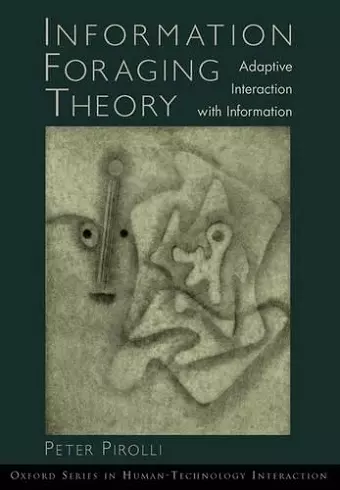Information Foraging Theory
Adaptive Interaction with Information
Format:Paperback
Publisher:Oxford University Press Inc
Published:8th Apr '10
Currently unavailable, and unfortunately no date known when it will be back

Although much of the hubris and hyperbole surrounding the 1990's Internet has softened to a reasonable level, the inexorable momentum of information growth continues unabated. This wealth of information provides resources for adapting to the problems posed by our increasingly complex world, but the simple availability of more information does not guarantee its successful transformation into valuable knowledge that shapes, guides, and improves our activity. When faced with something like the analysis of sense-making behavior on the web, traditional research models tell us a lot about learning and performance with browser operations, but very little about how people will actively navigate and search through information structures, what information they will choose to consume, and what conceptual models they will induce about the landscape of cyberspace. Thus, it is fortunate that a new field of research, Adaptive Information Interaction (AII), is becoming possible. AII centers on the problems of understanding and improving human-information interaction. It is about how people will best shape themselves to their information environments, and how information environments can best be shaped to people. Its roots lie in human-computer interaction (HCI), information retrieval, and the behavioral and social sciences. This book is about Information Foraging Theory (IFT), a new theory in Adaptive Information Interaction that is one example of a recent flourish of theories in adaptationist psychology that draw upon evolutionary-ecological theory in biology. IFT assumes that people (indeed, all organisms) are ecologically rational, and that human information-seeking mechanisms and strategies adapt the structure of the information environments in which they operate. Its main aim is to create technology that is better shaped to users. Information Foraging Theory will be of interest to student and professional researchers in HCI and cognitive psychology.
This book significantly deepens our scientific understanding of a class of increasing important human activities. It will become a standard reference for a future research. * John R. Anderson, R. K. Mellon University Professor of Psychology and Computer Science, Carnegie Mellon University *
Nothing is as practical as a good theory. We need practical techniques beyond mere usability experiments for designing the information machines of the Internet and mobile appliances. In this book, Peter Pirolli supplies such a theory, driving the program to have a supporting science of HCI forward to the next plane: from mechanistic theories based on the limitations of cognitive mechanisms to an applied science that emphasizes and predicts adaptation to the information environment. In so doing he advances the core theories of information cognition themselves in the tradition of Simon, Newell, Anderson, and Brunswik. * Stuart K. Card, Senior Research Fellow, Palo Alto Research Center, Xerox PARC *
In a field as rich and complex as the interaction of people with information systems, fundamental theoretical advances are rare. I recall still the excitement of reading (and often reviewing) Peter Pirolli's early papers on Information Foraging Theory. This book is not light reading, but it is worthwhile reading: both well founded and practical; expect to be challenged and expect to learn. I hope this book will not only inform its readers, but will also be an inspiration to future researchers as to what is possible at the fascinating boundary between mind and machine. * Alan Dix, Professor, Computing Department, Lancaster University *
Pirolli's book represents a significant achievement in both science and engineering * providing broad, theoretically based and empirically validated insights into human information behavior and the design of information artifacts. It will be a classic, of importance to the several fields it brings together, cognitive psychology, human computer interaction, and library and information science, and of interest to several others ranging from economics to field biology. It is a deep and substantial body of work, conveyed with clarity and erudition. The theory at its heart is quite simplethat people try to optimize their consumption of relevant informationbut its implications are worked out in elegant detail for a surprising variety of instructive and practical circumstances.George W. Furnas, Professor and Associate Dean, School of Information, University of Michigan *
This is a wonderful and exceptionally interesting book. It shows the key role that behavioral ecology, particularly foraging theory, plays in web searches and how psychology, computer science and behavioral ecology blend in a seamless manner in the study of this subject. Pirolli opens a new world for behavioral ecologists and computer scientists alike. * Marc Mangel, Professor and Fellow, John Baskin School of Engineering, University of California, Santa Cruz *
Information foraging is the most important concept to emerge from Human-Computer Interaction research in the last decade. * Jakob Nielsen, Nielsen Norman Group, and author, Designing Web Usability *
...a very interesting read...Pirolli's groundbreaking work and his "ah-ha" insight, since the late 1980s, occurred in just the environment that was needed for this insight to emerge...I applaud Pirolli and his having gone walkabout, shopping in the outback. * PsycCritiques *
ISBN: 9780195387797
Dimensions: 175mm x 251mm x 18mm
Weight: 462g
224 pages